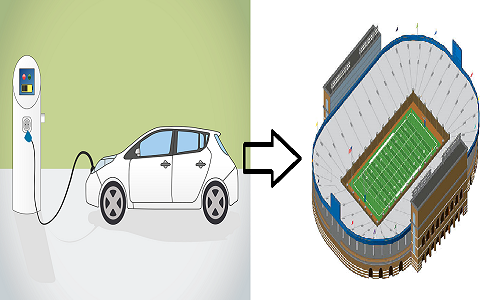Power management company Eaton has just announced that their previous plan of using old EV batteries to power buildings will now expand to sports stadiums.
The Nissan Leaf is among many electric-powered vehicles currently on the market. Eaton initially partnered with Nissan in 2015 to harness renewable and reliable energy for residential buildings around Europe using power from old Nissan Leaf batteries.
However earlier this month, Eaton’s senior vice president Craig McDonnell stated that the businesses are in talks with football stadiums as well.
“The football stadium community is interested,” stated McDonnell. “From significant ones, (we are talking) with 5-6 stadiums in Europe.”
Eaton predicts that using retired EV batteries for power will become increasingly common as the potential value market of electric vehicles is expected to be $2.3 billion by 2025 and the growing concern surrounding what to do with E.V. batteries is increasing.
Electric vehicle batteries are made of lithium-ion, an extremely difficult-to-recycle material. Many auto wrecking facilities are left clueless as to what to do with them, and some fear the high-risks that come with working with the battery as the material contains many heavy metals and toxic chemicals.
“The electric vehicle landscape and lithium-ion batteries are continuously developing”, Ajay Kochhar, President, and CEO of Li-Cycle told Collision Repair. “When there is a higher end-of-lifecycle value there is often a higher recycling rate.”
This isn’t the first time Nissan and Eaton have thought of a creative way to reuse batteries. Nissan has also used its batteries to light streets in Japan in 2018 in an initiative called “Reborn Light”.
“Even when batteries no longer serve to power cars, they can be reborn to keep serving humans,” stated Nissan.
For more information on Eaton and Nissan’s new project, visit eaton.com


























